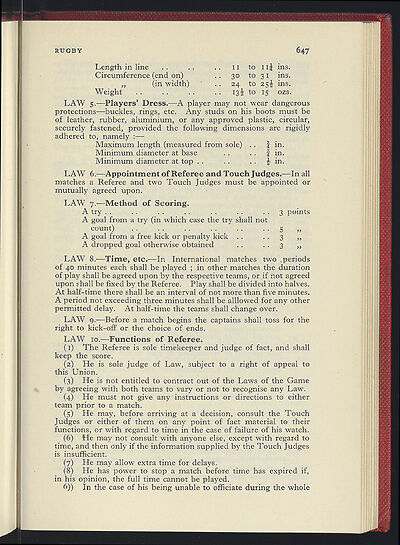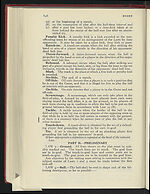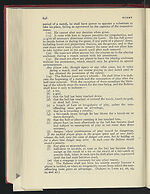1957-58
(669)
Download files
Complete book:
Individual page:
Thumbnail gallery: Grid view | List view

i
f
4
RUGBY
647
Length in line
I I
to
I IJ
ins.
Circumference (end on) 3
0
to 31 ins.
„ (in width) 24 to
251
ins.
Weight IA to 15 ozs.
LAW 5.—
Players' Dress.
—A player may not wear dangerous
protections—buckles, rings, etc. Any studs on his boots must be
of leather, rubber, aluminium, or any approved plastic, circular,
securely fastened, provided the following dimensions are rigidly
adhered to, namely :—
Maximum length (measured from sole) in.
Minimum diameter at base in.
Minimum diameter at top .. in.
LAW 6.—
Appointment of Referee and Touch Judges.
—In all
matches a Referee and two Touch Judges must be appointed or
mutually agreed upon.
LAW 7.—
Method of Scoring.
A try . .
A goal from a try (in which case the try shall not
count)
A goal from a free kick or penalty kick
A dropped goal otherwise obtained
3 points
5
3
3
LAW 8.
—Time, etc.
—In International matches two .periods
of
40
minutes each shall be played ; in other matches the duration
of play shall be agreed upon by the respective teams, or.if not agreed
upon shall be fixed by the Referee. Play shall be divided into halves.
At half-time there shall be an interval of not more than five minutes.
A period not exceeding three minutes shall be alllowed for any other
permitted delay. At half-time the teams shall change over.
LAW q.—Before a match begins the captains shall toss for the
right to kick-off or the choice of ends.
LAW io.—
Functions of Referee.
(i) The Referee is sole timekeeper and judge of fact, and shall
keep the score.
(2)
He is sole judge of Law, subject to a right of appeal to
this Union.
(3) He is not entitled to contract out of the Laws of the Game
by agreeing with both teams to vary or not to recognise any Law.
(4) He must not give any
-
instructions or directions to either
team prior to a match.
(5) He may, before arriving at a decision, consult the Touch
Judges or either of them on any point of fact material to their
functions, or with regard" to time in the case of failure of his watch.
(6) He may not consult with anyone else, except with regard to
time, and then only if the information supplied by the Touch Judges
is insufficient.
(7) He may allow extra time for delays.
(8) He has power to stop a match before time has expired if,
in his opinion, the full time cannot be played.
6))
In
the case of his being unable to officiate during the whole
I
f
4
RUGBY
647
Length in line
I I
to
I IJ
ins.
Circumference (end on) 3
0
to 31 ins.
„ (in width) 24 to
251
ins.
Weight IA to 15 ozs.
LAW 5.—
Players' Dress.
—A player may not wear dangerous
protections—buckles, rings, etc. Any studs on his boots must be
of leather, rubber, aluminium, or any approved plastic, circular,
securely fastened, provided the following dimensions are rigidly
adhered to, namely :—
Maximum length (measured from sole) in.
Minimum diameter at base in.
Minimum diameter at top .. in.
LAW 6.—
Appointment of Referee and Touch Judges.
—In all
matches a Referee and two Touch Judges must be appointed or
mutually agreed upon.
LAW 7.—
Method of Scoring.
A try . .
A goal from a try (in which case the try shall not
count)
A goal from a free kick or penalty kick
A dropped goal otherwise obtained
3 points
5
3
3
LAW 8.
—Time, etc.
—In International matches two .periods
of
40
minutes each shall be played ; in other matches the duration
of play shall be agreed upon by the respective teams, or.if not agreed
upon shall be fixed by the Referee. Play shall be divided into halves.
At half-time there shall be an interval of not more than five minutes.
A period not exceeding three minutes shall be alllowed for any other
permitted delay. At half-time the teams shall change over.
LAW q.—Before a match begins the captains shall toss for the
right to kick-off or the choice of ends.
LAW io.—
Functions of Referee.
(i) The Referee is sole timekeeper and judge of fact, and shall
keep the score.
(2)
He is sole judge of Law, subject to a right of appeal to
this Union.
(3) He is not entitled to contract out of the Laws of the Game
by agreeing with both teams to vary or not to recognise any Law.
(4) He must not give any
-
instructions or directions to either
team prior to a match.
(5) He may, before arriving at a decision, consult the Touch
Judges or either of them on any point of fact material to their
functions, or with regard" to time in the case of failure of his watch.
(6) He may not consult with anyone else, except with regard to
time, and then only if the information supplied by the Touch Judges
is insufficient.
(7) He may allow extra time for delays.
(8) He has power to stop a match before time has expired if,
in his opinion, the full time cannot be played.
6))
In
the case of his being unable to officiate during the whole
I
Set display mode to:
![]() Universal Viewer |
Universal Viewer | ![]() Mirador |
Large image | Transcription
Mirador |
Large image | Transcription
| Games and sports in the army > 1957-58 > (669) |
|---|
| Permanent URL | https://digital.nls.uk/248859697 |
|---|
| Description | 'Games and Sports in the Army' was an annual publication produced by the British War Office between the 1930s and 1960s. This included the Second World War. It outlines the rules and regulations for games and sports played by members of the armed forces. It features names and photographs of team members, and examples of contemporary advertising. |
|---|---|
| Shelfmark | GWB.52 |

